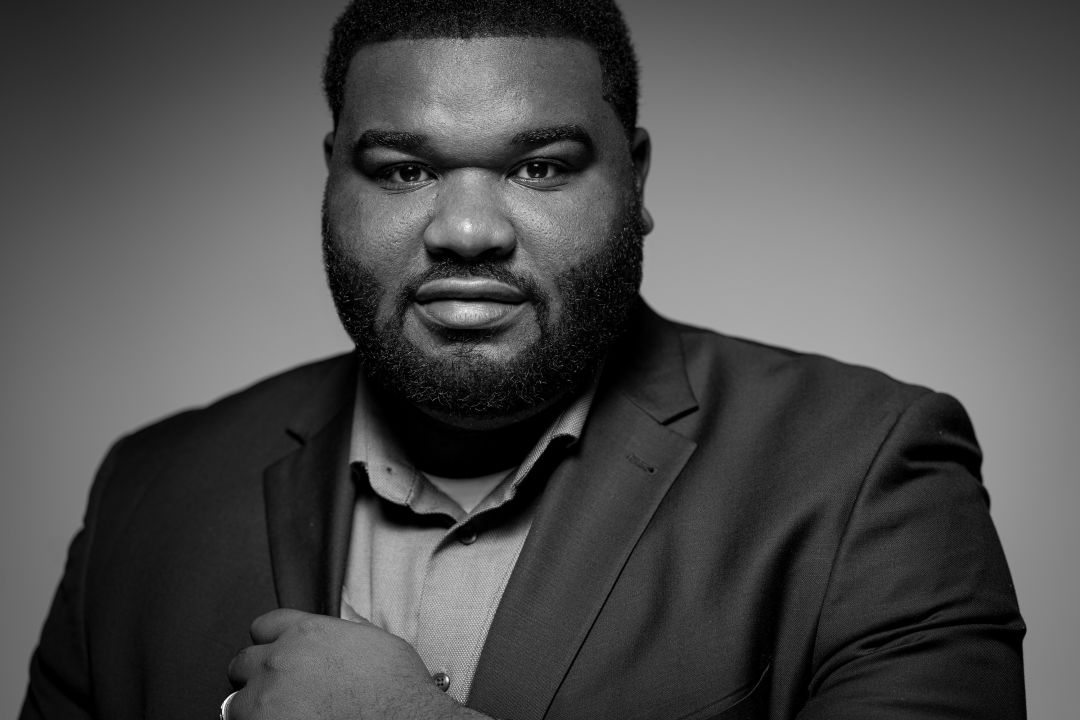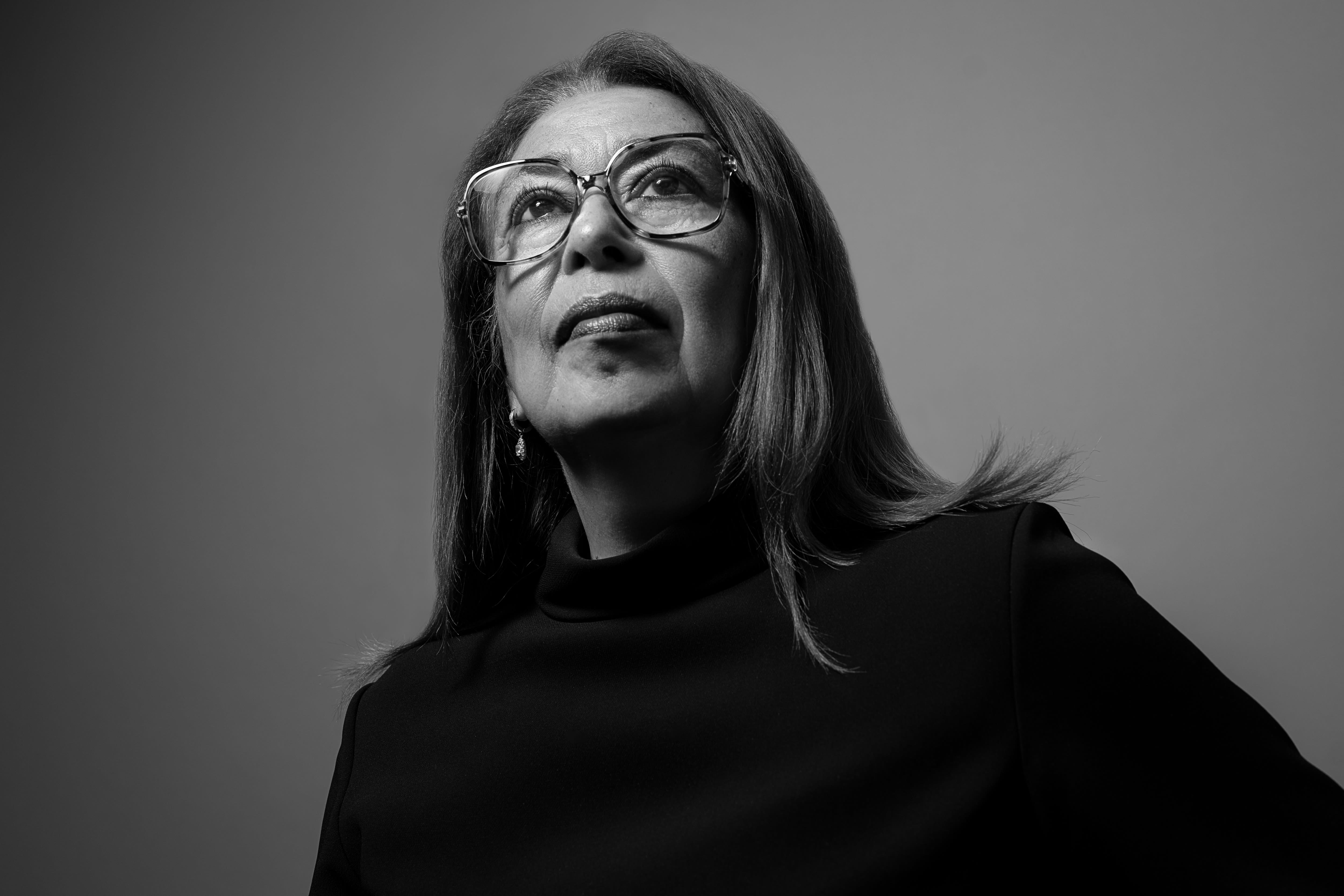Conductor and Minister Jamal Sarikoki on Music and Keeping Faith in the Face of Racism
This article is part of the series Listening to Diverse Voices, proudly presented by Gulf Coast Community Foundation.

Jamal Sarikoki
Image: Michael Kinsey
Born and raised in Chicago, Jamal Sarikoki found his way to classical music at the age of 4 when his mother, Bessie, enrolled him in a music program at Sherwood Conservatory. Since then, he’s mastered the violin, viola and organ—and he’s also a minister, conductor, and an operatic and oratorio singer, known for his vocal agility and legato line.
Sarikoki, who landed his first conducting role at age 16, studied conducting and organ at Nyack College in New York and was enrolled in the graduate conducting program at Bard Conservatory. He then spent three years serving as a music associate at West Point Cadet Chapel U.S. Military Academy under the tutelage of world-renowned organist Craig Williams. Later, he served as senior organist and director of instrumental music at Calvary Baptist Church in Manhattan.
Today, at 29, Sarikoki is the associate conductor for Key Chorale and minister of music and worship at Venice Presbyterian Church, where he is the first Black elder. He moved to Sarasota in 2018 with his wife of three years, Genna. Their first child—a baby boy—is on the way.
Tell us about your childhood and your greatest influences.
“I grew up as an only child, but my first cousins were like siblings and we still talk every week. Mine was also a family of all women, some of whom played music in college. My mother and I are close, but my relationship to my grandmother, Geneva Dow, was unique and special—we thought exactly alike when it came to everything from church theology to our musical interests. We went on a lot of ‘dates’ together to church and concerts. If there was anyone who influenced me, she was the most impactful—woman or man—especially since my dad was not around, which is the unfortunate story for many Black children.
“But my mom didn’t try to fill that void. She was a role model on her own as a social justice warrior. All of the income from her job, as a supervisor of child protection investigators, went to providing a roof over our heads and toward my education, both academically and musically.”
What was it like growing up in Chicago?
“I grew up in the inner city. My family, faith and music saved me from ever having to go to the streets or live a difficult life.
“From preschool to seventh grade, I attended five different schools, from public to a few small private schools, which did not have funding to keep their doors open. I was always the class clown and most distracting to the other students. So, most of the time, my desk was in the corner. And it’s still my personality to be the center of attention, even though I’m shy by nature. Being in a leadership position, musically or pastorally, helps break me out of my shell to engage with others. It’s an outlet to be myself.”
What was it like being a young Black man in the largely white classical music space?
“From birth, my mom had a vision of me as a classical musician—that’s why she enrolled me in a general music class at the Sherwood Conservatory. I loved it; I have always loved it.
“At the program graduation, we were encouraged to walk around the conservatory to watch the master classes. That night, I desperately wanted to be a pianist, but my mom said, ‘I can’t afford to buy a piano,’ to which I replied, ‘You can make it work.’ But it was a definite ‘no.’
“Lucinda Ali, one of the only Black conservatory teachers at the conservatory, held a violin class, which is where my mom placed me. This class was an array of races and religions—Blacks, whites, Jewish, Asian. It was a special situation. This was not the way classical music looked in the larger scheme of things.
“Sometime after, Lucinda left to start her own conservatory on the South Side of Chicago, and I, and many other students, followed. There were even more Black students there than at Sherwood Conservatory. But Lucinda never pretended that this was the way the classical music profession looked on the whole. She made it clear that we had to work just as hard, or harder, than our white counterparts.”
What Black classical musical artists should we know?
“James DePreist, who died in 2013, was one of the most important Black conductors of the 20th century. He was director emeritus of conducting and orchestral studies at the Juilliard School and laureate music director of the Oregon Symphony at the time of his death. DePreist was awarded 15 honorary doctorates, and in 2005, President George W. Bush recognized him with the National Medal of the Arts.
“He broke barriers of what a Black man can be and become in classical music, and he needs to be recognized in music history. Every student should know his name.”
How has racism shown up throughout your life?
“At my first competition as a violinist, I was asked to get coffee for others at the event. They assumed I had no business there and that I had to be hired help, not a performer. It was my first experience in classical music where I felt that way. I was 13.
“Another example was in high school at 16, but this time it was full-on racism. I was proud to be playing piano and organ at a church service, which had an off-the-wall music program. After the service, one of the white parishioners—who happened to be the grandfather of a classmate—said, ‘I don’t really care for n-word’s playing in my church.’ Internally, I was upset and calling him every swear word possible. But outwardly, I was afraid of coming off as an angry Black teen. In that moment, I reminded myself to display the gospel, and that the church consists of many flawed beings. Christ never said otherwise. People are human and not perfect. The Lord calls us to serve and do what we can to change opinions like his.”
Since you're a minister, tell us how the Black community remains kind-hearted in the face of 400 years of subjugation.
“One important thing to know is that many in the Black community are split, from social justice to politics, on whether they are conservative in their views or not.
“My grandmother shared a story from her youth during the 1920s and ‘30s, when she lived in Brookhaven, Mississippi, a tiny town outside Jackson. She saw a Black man dragged behind a pickup truck to his death. Even into her late years, she had a healthy fear of white people because of how she grew up. It was far worse than anything my mom and her siblings experienced in segregated Chicago. Before my grandmother died, she gave me her blessing to marry my wife, who is white.
“The key to surviving hundreds of years of subjugation, for a lot of Black people, is the Christian faith. While there are theological differences, we strive to be like Jesus. I've lost track of how many of Dr. Martin Luther King Jr.’s sermons preach to ‘turn the other cheek.’ I think what’s missed is that Black people have lived through racism and oppression by living out the gospel. It changes hearts and perceptions.
“I’ve seen it in my own life. For instance, white people who were raised with the dogma that they are better because of their skin color. I worked hard to change that perception by being hospitable and loving toward people of all races. This is the only way to move forward. We still have to march and work hard and to speak up for the rights of all people, especially lately with the hate against Asian-Americans. It’s a lot.”
Tell us what it’s like to be in a biracial marriage.
“My wife and I met in New Jersey, where Genna was teaching second grade in Newark in a low-income community where the parents couldn’t care less about their children. I greatly admire her for what she did for those kids, including using her salary to be sure they had food and school supplies. She even went as far as broaching the subject of us fostering a couple of the children. If there is anyone in my life, outside of my race, who understands the struggle firsthand, it’s my wife.
“When it came to our relationship, it was one thing to be dating, but when it turned to engagement and marriage, it was another. Her parents had an issue—not because of animosity toward the Black community, but because they understood that by us moving to Florida, we were moving to a pejorative white community. To be frank, some here have found our marriage disgusting.”
“My mother did not approve of me dating or marrying a white person. It took a long time for her to come around. Other family members were happy for us. In fact, my aunt spent her career in the Chicago public education system, so she gravitated to Genna right away, because she’s an educator.
“If anyone hates our marriage, it’s not because of who we are, but how we look. That does not bother me, though, because that’s their bigotry and ignorance, and they have to work that out for themselves.”
What would you like your white friends or acquaintances to be doing right now?
“I’m a minister at a church, where in season and prior to Covid-19, 1,500 people walked through the doors every Sunday. Other churches within our presbytery have invited me to preach at their pulpits. Putting a Black person in a major leadership role is important for making change. It’s one thing to have a Black elder on a board or leading a music program, but that ultimately means they are in smaller leadership roles. This is different; with me in this role as a minister, it’s already created a seismic shift.”
“As for the American classical music institution, we’ve seen more Black musicians in everything, from orchestras to chorale programs, but we still have not seen an influx in Black people standing on the podium, nor as CEOs of major orchestras. And many symphonies are still led by white European conductors. Until it becomes the norm for Black people to be in authority positions—and there’s willingness from our white brothers and sisters to submit to Black leadership and authority—there will never be a change.”
Listening to Black Voices is a series created by Heather Dunhill.




